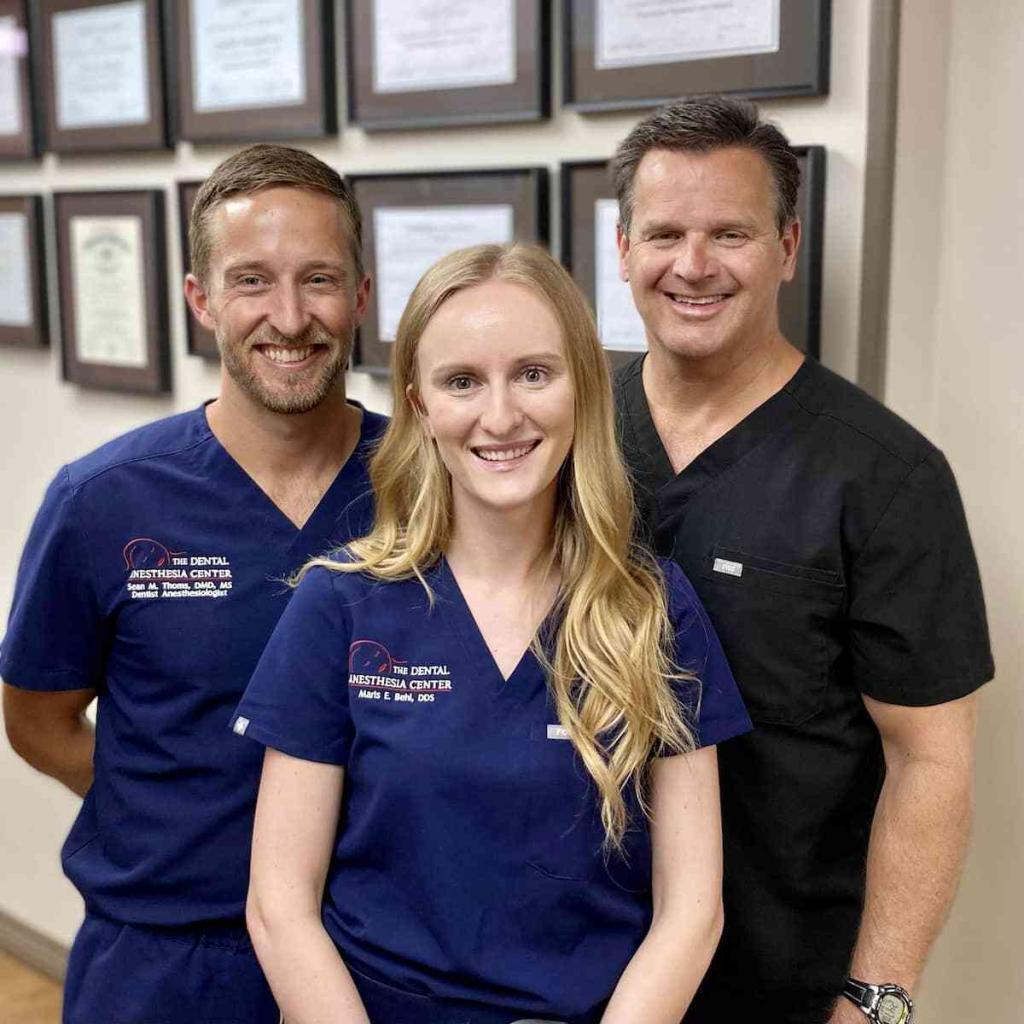Specialized sedation options for patients with cognitive disabilities at DAC, where we make dental care comfortable and accessible.
For individuals with cognitive disabilities, a visit to the dentist can present unique challenges that extend far beyond typical dental anxiety. Sensory sensitivities, communication difficulties, and challenges with following instructions can transform routine dental care into a deeply stressful experience for patients, caregivers, and dental professionals alike.

Understanding the Dental Challenges Faced by Patients with Cognitive Disabilities
Patients with cognitive disabilities—including those with autism spectrum disorders, Down syndrome, cerebral palsy, traumatic brain injuries, and other developmental or acquired conditions—often face multiple barriers to dental care:
Communication Challenges
Many patients with cognitive disabilities experience difficulties:
- Understanding complex dental instructions
- Expressing discomfort or concerns
- Processing multiple sensory inputs simultaneously
- Comprehending abstract concepts like “this won’t hurt for long”
Sensory Sensitivities
Dental environments present numerous sensory challenges:
- Bright overhead lighting
- Unfamiliar tastes and textures
- The distinctive sounds of dental equipment
- The physical sensation of instruments in the mouth
- Unexpected touch around the face and mouth
Behavioral Considerations
Some patients may display:
- Involuntary movements that complicate dental procedures
- Anxiety manifestations that differ from those of neurotypical patients
- Difficulty remaining still for extended periods
- Responses to stress that may include self-protective behaviors
Medical Complexity
Cognitive disabilities often coexist with:
- Seizure disorders requiring specialized management
- Medication regimens that may interact with sedatives
- Anatomical differences affecting airway management
- Cardiovascular or respiratory conditions requiring monitoring
The Importance of Individualized Sedation Planning
The diversity among patients with cognitive disabilities means that no single sedation approach works universally. Effective care requires a comprehensive assessment that considers:
Patient-Specific Factors
- The nature and severity of cognitive disability
- Previous dental experiences and responses
- Communication abilities and preferred methods
- Sensory sensitivities and triggers
- Behavioral patterns and coping mechanisms

Treatment-Related Considerations
- Complexity and duration of needed dental procedures
- Urgency of treatment needs
- Frequency of treatment requirements
- Long-term dental care goals
Support System Dynamics
- Caregiver preferences and concerns
- Home care capabilities
- Transportation and recovery assistance
- Financial and insurance considerations
Sedation Options for Patients with Cognitive Disabilities
At The Dental Anesthesia Center, we offer a spectrum of sedation approaches that can be tailored to individual needs:
Nitrous Oxide
What it involves: Breathing a mixture of nitrous oxide (laughing gas) and oxygen through a comfortable nose mask.
Advantages for patients with cognitive disabilities:
- Rapid onset and recovery
- Easily adjustable levels during treatment
- Minimal pre-procedure preparation
- Few medication interactions
- Patient remains conscious and can communicate
Best suited for:
- Patients with mild anxiety or sensory sensitivities
- Those who can follow basic instructions and tolerate the nose mask
- Patients requiring brief, minimally invasive procedures
- Individuals who need to return to normal activities quickly
Oral Conscious Sedation
What it involves: Taking prescribed medication (usually in pill form) before the dental appointment to induce a state of deep relaxation while remaining conscious.
Advantages for patients with cognitive disabilities:
- No needles required for administration
- Creates significant anxiety reduction
- Produces partial amnesia of the procedure
- Allows basic communication during treatment
- Can be administered at home before arriving (reducing anticipatory anxiety)
Best suited for:
- Patients with moderate anxiety or sensitivities
- Those requiring longer appointments for multiple procedures
- Individuals who can take oral medication reliably
- Patients with a reliable caregiver for transportation and monitoring
IV Sedation
What it involves: Medication administered intravenously to create a state of deep relaxation where the patient may drift in and out of consciousness but can be roused with stimulation.
Advantages for patients with cognitive disabilities:
- Precise control over sedation levels
- Rapid onset of sedation effect
- Significant amnesia of the procedure
- Ability to complete extensive treatment in one visit
- Reduced awareness of sensory triggers
Best suited for:
- Patients with significant anxiety or sensory sensitivities
- Those requiring extensive dental work
- Individuals who have had unsuccessful experiences with lighter sedation
- Patients who can tolerate initial IV placement (with topical anesthesia)
General Anesthesia
What it involves: Medication that induces complete unconsciousness, administered and monitored by a qualified anesthesia provider.
Advantages for patients with cognitive disabilities:
- Complete unawareness during dental procedures
- Elimination of anxiety, pain, and sensory issues during treatment
- Ability to perform comprehensive dental rehabilitation in a single visit
- Prevention of potentially traumatic experiences
- No cooperation required during treatment
Best suited for:
- Patients with severe cognitive disabilities who cannot cooperate with other approaches
- Those with significant sensory processing disorders
- Individuals requiring extensive, complex dental treatment
- Patients with involuntary movements that could compromise safety
- Those who have had unsuccessful experiences with other sedation methods
Beyond Sedation: Creating an Approach
While sedation is often essential for providing dental care to patients with cognitive disabilities, we recognize that it’s just one component of a comprehensive approach. Our care model also incorporates:
Environmental Accommodations
We can modify the dental environment to reduce potential triggers:
- Scheduling appointments during quieter times
- Minimizing waiting time in an unfamiliar environment
- Dimming lights or providing sunglasses
- Offering noise-canceling headphones
- Using weighted blankets for comfort and security
- Creating a “sensory-friendly” treatment room
Communication Adaptations
We tailor our communication approach to each patient’s needs:
- Using simple, concrete language
- Employing visual schedules and social stories
- Offering communication boards or assistive technology
- Demonstrating procedures on models first
- Using consistent, predictable sequencing of events
Behavioral Support Strategies
We incorporate positive behavioral approaches:
- Utilizing tell-show-do techniques adapted to cognitive ability
- Breaking treatment into manageable steps
- Providing positive reinforcement for cooperation
- Offering frequent breaks when using lighter sedation
- Collaborating with behavioral specialists when appropriate
The Role of Regular Preventive Care
While sedation dentistry provides a solution for necessary treatment, our ultimate goal is to minimize the need for extensive interventions through:
Preventive Focus
We emphasize:
- Frequent, brief maintenance visits (potentially with minimal sedation)
- Aggressive preventive measures like sealants and fluoride treatments
- Modified home care approaches tailored to cognitive ability
- Caregiver training on effective oral hygiene assistance
Desensitization When Appropriate
For some patients, gradual desensitization to dental environments may be possible:
- Beginning with very brief, positive exposures to the dental office
- Gradually increasing familiarity with dental equipment
- Using positive reinforcement for each successful step
- Potentially reducing sedation levels over time as comfort increases
Dignity Through Specialized Care
At The Dental Anesthesia Center in St. Louis, we believe that all patients deserve access to compassionate, high-quality dental care that respects their dignity and addresses their unique needs. For patients with cognitive disabilities, appropriate sedation approaches can transform dental care from a source of distress to a manageable part of their healthcare routine.
By carefully assessing each patient’s individual needs, collaborating with caregivers, and drawing on our specialized training in sedation techniques, we create personalized care plans that allow patients with cognitive disabilities to receive essential dental treatment while minimizing stress and discomfort.

Contact The Dental Anesthesia Center Today
If you care for someone with a cognitive disability who struggles with dental visits, we invite you to contact our team to explore how our individualized sedation approaches might help. Together, we can develop a sustainable plan for maintaining oral health that respects both physical and emotional well-being.
Contact The Dental Anesthesia Center at (314) 862-7844 to schedule a consultation with our specialized team, which is experienced in caring for patients with cognitive disabilities.

